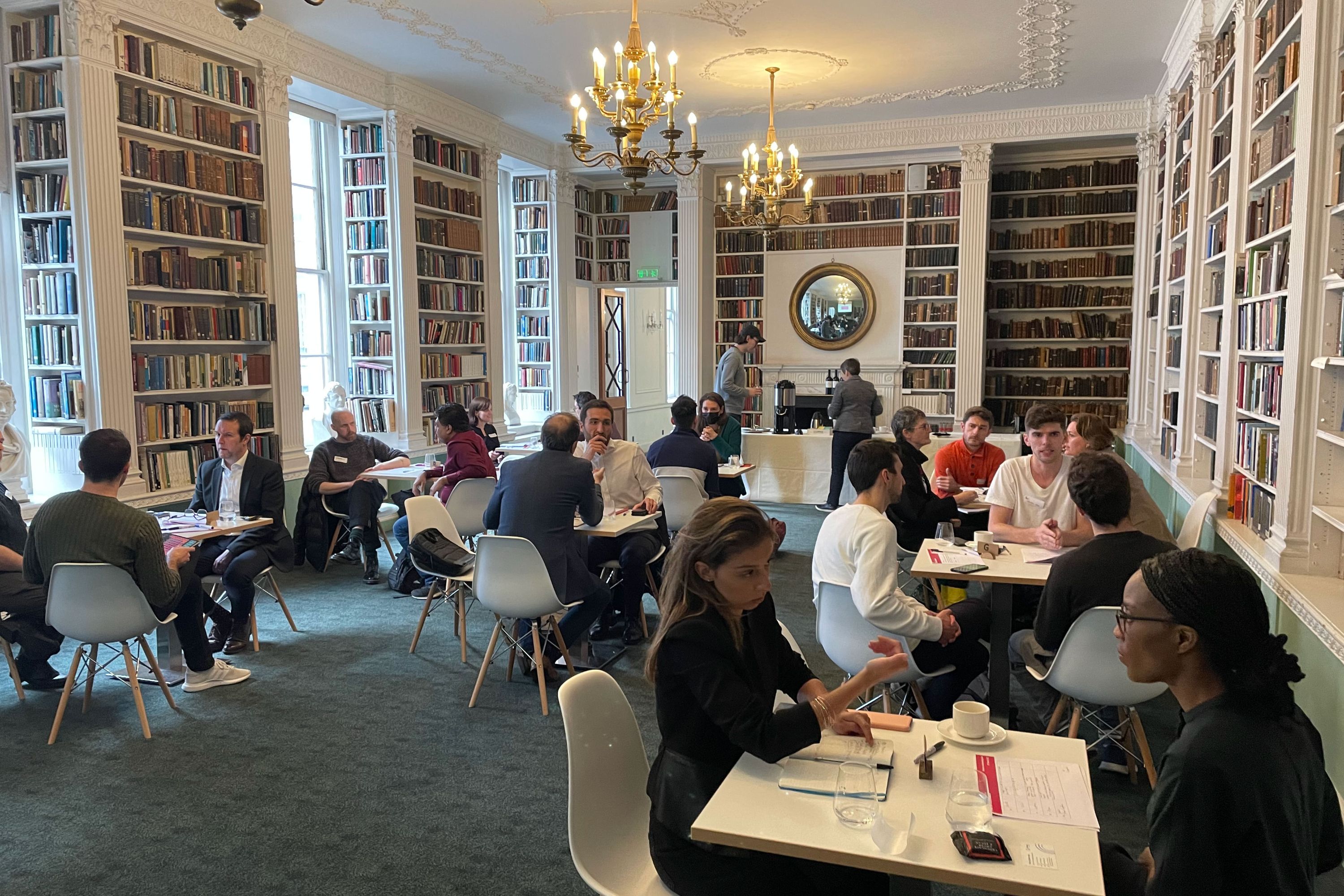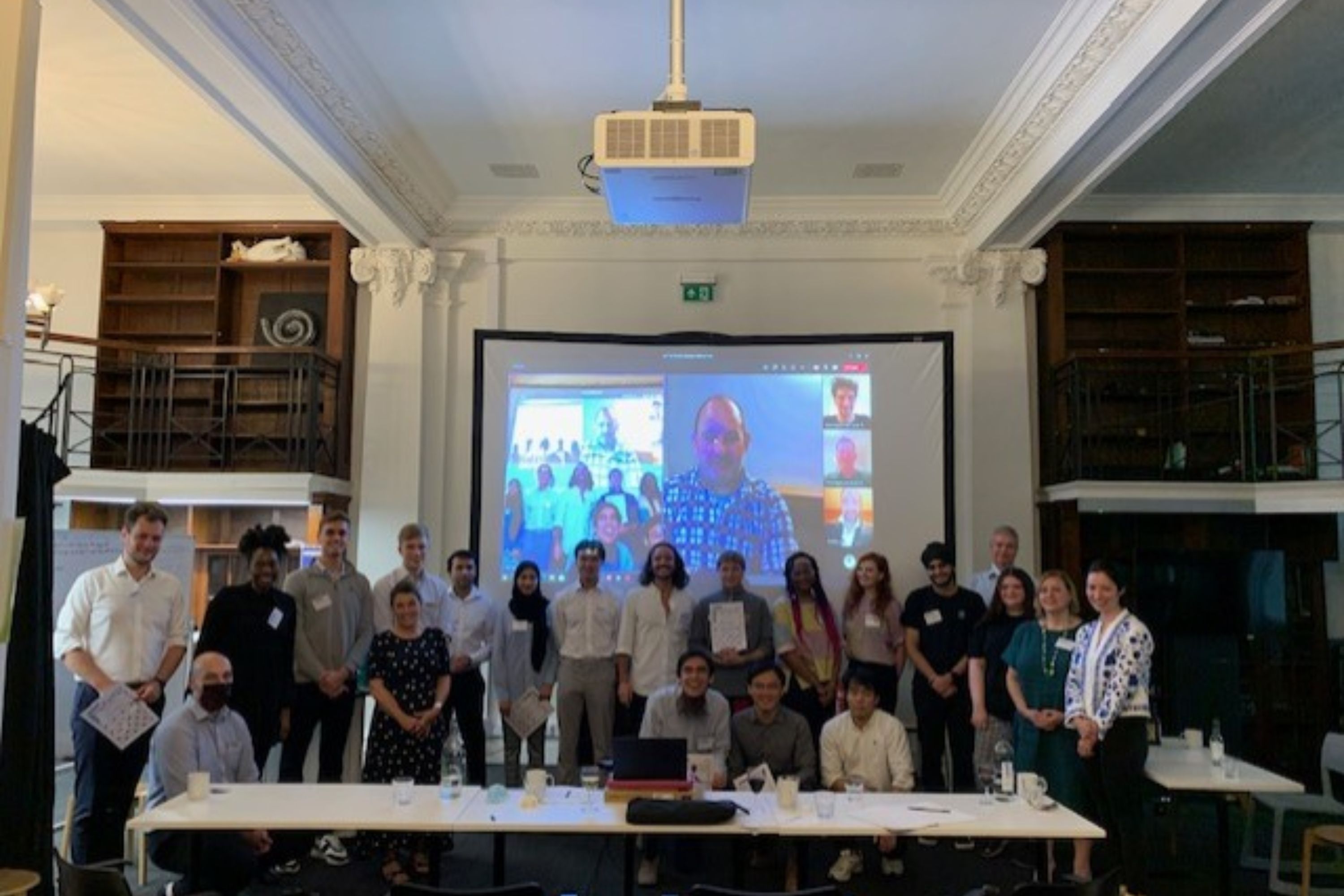
The Centre for Climate Change Innovation is a diverse network of leading public and private entities that share a commitment to supporting sustainable economic growth. Speed networking events for investors and members of The Greenhouse accelerator are just one of the activities taking place at the Centre’s headquarters at the Royal Institution in the heart of London.
How do we remain undaunted in the face of climate change and ecological disaster? Our innovation activities create value, supporting the growth of new ideas and businesses while solving our toughest environmental challenges. Since launching our bold new Centre for Climate Change Innovation with the Royal Institution at the start of 2021, we have made great strides; recruiting 44 new startups and helping them raise over £5 million to get their businesses going. We jointly organised a series of online and in-person public events, exploring climate innovation, leadership and engagement with solutions. We have committed to focus on creating greater connections amongst London’s climate innovation community, improving the diversity and inclusion of the sector and engaging a range of communities with entrepreneurship and employment in green jobs.
Imperial and the Royal Institution are proud to be working with our founding partners: Arup, the Mayor of London, HSBC UK, Centre for Net Zero, Pollination and Slaughter and May. If you would like to be involved, we are looking to add additional corporate members to our group. There are opportunities to support our core activities, including leadership training, exhibitions of climate technology, innovation policy workshops and future public lectures.
pandemic to net zero
- Profile: Maysa Abadi, Co-founder of Honeycomb Network
- In-person events welcomed by investors and startups
- Young talent joins the centre through government scheme
- London school pupils meet climate startups
- Quick read: Ones to watch
 Maysa Abadi is in the fourth year of an MEng in Molecular Bioengineering and the co-founder of Honeycomb Network. The idea stemmed from an entrepreneurship module the team took as part of their course and following market research they realised there was a gap in the market for their solution. Honeycomb Network is developing a smart storage and charging network to support private micromobility (e-scooters and e-bikes). Their locker pods are kitted with universal charging leads to cater to any e-scooter brand or model and their cutting-edge smart-charging algorithms will ensure each battery is charged in the healthiest way to prolong battery life and reduce lithium-ion waste. Through the Honeycomb app users will be able to find vacant locker pods, charge their e-scooter and track the status of their charge remotely.
Maysa Abadi is in the fourth year of an MEng in Molecular Bioengineering and the co-founder of Honeycomb Network. The idea stemmed from an entrepreneurship module the team took as part of their course and following market research they realised there was a gap in the market for their solution. Honeycomb Network is developing a smart storage and charging network to support private micromobility (e-scooters and e-bikes). Their locker pods are kitted with universal charging leads to cater to any e-scooter brand or model and their cutting-edge smart-charging algorithms will ensure each battery is charged in the healthiest way to prolong battery life and reduce lithium-ion waste. Through the Honeycomb app users will be able to find vacant locker pods, charge their e-scooter and track the status of their charge remotely.
Maysa is inspired by her co-founders, who are “hardworking individuals and are incredible at what they do.” As for her goals, she says: “To truly support low-carbon transport such as micromobility we need the supporting storage and charging infrastructure they are dependent on – this is where Honeycomb comes in! We hope to inspire the use of micromobility, educate the wider community on the benefits of sustainable and active travel and of course, play our part in mitigating climate change.”
The team are part of a 12-month innovation programme for climate positive technology startups, The Greenhouse Accelerator, based at the Centre for Climate Change Innovation (CCCI), which is an initiative founded by the Grantham Institute and the Royal Institution.
Physical events have resumed at the Centre for Climate Change Innovation (CCCI) with its headquarters at the Royal Institution. The grand central London venue, and partner in the initiative, aims to become the beating heart of London climate innovation community, with many such occasions for networking, collaboration and training.
 At one early event, around 20 early-stage investors made lively conversation with 15 startups from The Greenhouse – the CCCI’s accelerator, which is supported by HSBC UK – and representatives from London-based businesses with aspirations to acquire low-carbon solutions.
At one early event, around 20 early-stage investors made lively conversation with 15 startups from The Greenhouse – the CCCI’s accelerator, which is supported by HSBC UK – and representatives from London-based businesses with aspirations to acquire low-carbon solutions.
Jim Totty, Managing Director of Viridis Capital, who attended one of the new events, said: “The Greenhouse and the Centre for Climate Change Innovation are incubating some of the best new sustainable businesses that I’m seeing in the market. It’s fantastic to be able to meet so many great teams in one evening, offering exciting impact investment opportunities.”
 Two young people have joined the CCCI team thanks to a six-month programme that creates job placements for young people aged 16–24 years.
Two young people have joined the CCCI team thanks to a six-month programme that creates job placements for young people aged 16–24 years.
The new roles – known as Analysts – joined through a UK government scheme called Kickstart. Armelle, who recently graduated with a BSc degree in Geography with Economics, supports the activities of The Greenhouse accelerator programme and Raabiah (pictured, right), part-time graduate student in Environment, Politics and Development, supports project management and communication activities across the Centre.
Armelle said: “I have been very warmly welcomed by the team. It has been great so far to meet founders, mentors and investors (in person!) and […] better my understanding of climate change from the perspective of innovation and moving away from business as usual.”
The CCCI welcomed close to four hundred London school pupils with a passion for solutions to climate change and the ecological emergency ahead of the UN Climate Change Conference (COP26).
Pupils aged 12–14 years had the chance to meet scientists, students and professionals working on startups who aim to make the world a better place. The five startups who presented their personal journeys at the event included FlexSea, who make a soluble alternative to plastic wrapping.
Thibaut Monfort-Micheo, Chief Technology Officer and Co-Founder of FlexSea, said:
“Plastic is so omnipresent in our lives that sadly even young students realize it’s a problem. We tried to spark hope with a demonstration of FlexSea film wrap dissolving in hot water, releasing some savoury chocolate powder to make a sweet hot beverage. We wanted it to be fun, educational and have a visually pleasing experience. Hopefully, they left the event with a cool anecdote to tell their parents, and with a hint of ambition to create novel technologies in the future to save the planet.”
Seratech is a young startup founded by two Imperial PhD researchers, receiving support from The Greenhouse accelerator programme. Sam Draper and Barney Shanks have developed a novel mineral additive and process that produces cement without any greenhouse gas emissions. This technology will soon be presented outside the lab for the first time.
Angry Monk is an online platform aggregating fresh, quality surplus food across the supply chain, which they sell to institutional canteens and food manufacturers. As a funnel for surplus produce, Angry Monk will also facilitate donations to food banks and charities. Next, co-founders Andrea Guariglia and Nathan Lucaussy hope to get a foothold in professional services and university canteens as they start trials of their service to address food waste.
Carbon Infinity is a promising startup that is developing a modular, highly scalable, direct air capture (DAC) technology for hard-to-decarbonise industries. Founders David Izikowitz and Jia Li hope to enable the production of fossil-free petrochemicals, synthetic fuels, carbon composite materials and other highvalue carbon-based products. Carbon Infinity will be looking to complete their first pilot plant in China this year.
Ferris is a zero-waste app for giving and getting once-loved items for free. It aims to inspire consumers to reduce waste by making the circular economy fun and rewarding. Founded by Phillip Galloway and Nick Castle, the Ferris app is currently available on Apple’s App Store and Google Play.
Contact us
General enquiries: grantham@imperial.ac.uk
Media: grantham.media@imperial.ac.uk
Phone us on: +44 (0)20 7594 9666
Privacy Notice
View the Grantham Institute Privacy Notice.